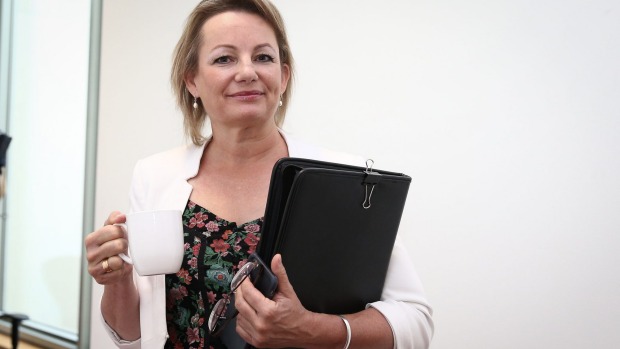
Health Minister Sussan Ley. Photo: Alex Ellinghausen
Some of Australia’s sickest people will pay more each year for their medicines due to a little-noticed change in last week’s federal budget.
Health Minister Sussan Ley on Monday announced an agreement with the Pharmacy Guild which she said would deliver “cheaper, more affordable medicines for consumers”, partly because pharmacies will have the option of cutting the patient contribution by $1 per script.
However, from January the government proposes to increase the amount patients have to pay each year before they qualify for free or more heavily discounted scripts under the Pharmaceutical Benefits Scheme safety net.
Currently, after general patients spend $1453.90 in a year on PBS medicines, they get further scripts for the rest of that year for $6.10 each. Under the budget proposal, this threshold will be increased by 10 per cent each year for four years, in addition to indexation in line with the consumer price index, eventually adding several hundred dollars to the amount patients must spend before qualifying for relief.
The threshold for concessional patients, currently $366, will increase by two scripts each year for four years, so that by 2019 they will be paying for eight more prescriptions a year before qualifying for free scripts.
The safety net changes are part of a bill currently before the Senate which the government estimates will save more than $1 billion over four years. The bill also includes proposals to increase the patient contribution for general patients by $5 a script and for concessional patients by 80¢ a script.
With Labor and the Greens opposed to the changes, the government will need to secure crossbench support to get them through the upper house.
On Monday Ms Ley distanced herself from the proposal to increase PBS patient contributions, describing it as “a separate measure I inherited from the last budget”, and stressing the $1 discount and other measures to make medicines cheaper would not be contingent upon the proposal.
She said her focus was on delivering a new package of measures which would “balance the need for consumers to have affordable access to medicines now with the need to fund new drugs in the future”.
It is understood while Ms Ley remains committed to finding savings to offset the cost of new drug listings, she is considering alternatives to the increase to patient contributions.
Consumers Health Forum chief executive officer Leanne Wells said the proposals to make patients pay more for drugs were “a concern for consumers, particularly the chronically ill”.
“This direction is at odds with the government’s reform proposals aimed at resetting Medicare, particularly to improve care for the chronically ill,” she said.
Greens leader Richard Di Natale? accused the government of being “intent on balancing the budget on the back of the sick and vulnerable”.
“You don’t improve health by shifting costs onto patients,” he said.
Labor health spokeswoman Catherine King said the proposal “exposed” Ms Ley’s promises of cheaper medicines as “a lie”.
“If the minister is serious about making medicines ‘more affordable for consumers’ she must abandon the hike in the costs of prescriptions and her cruel plan to force pensioners with the greatest health needs to spend even more on their essential medicines,” she said.
